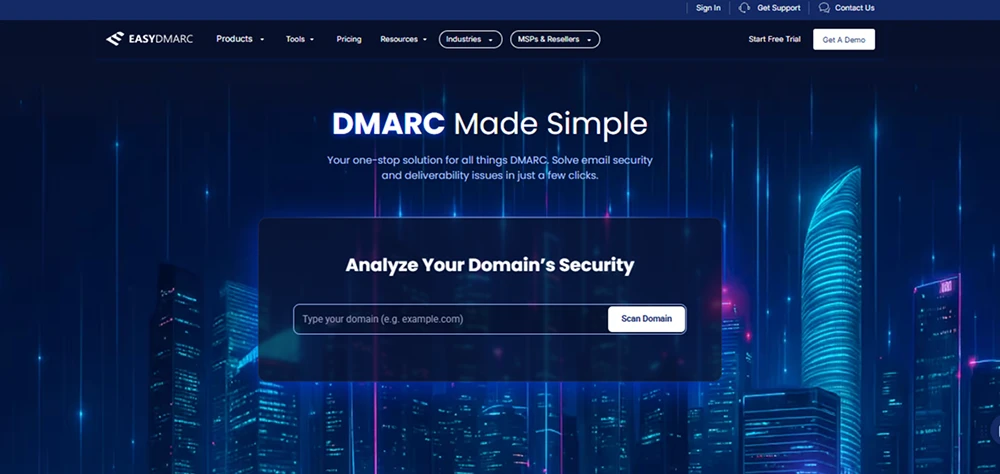EasyDMARC Overview & 2026 Industry Position
Amid rising threats and regulatory shifts in email communication, EasyDMARC has positioned itself as a foundational platform in the email authentication ecosystem. Designed to simplify Domain-based Message Authentication, Reporting, and Conformance (DMARC), EasyDMARC caters to businesses of all sizes that seek secure, policy-driven email infrastructure. By 2025, EasyDMARC is not just a DMARC provider—it’s an intelligent policy orchestration engine that actively mitigates phishing risks, drives deliverability KPIs, and addresses compliance mandates with ease.
From Launch to 2026: EasyDMARC’s Journey
Founded in 2017 in the cybersecurity hub of Yerevan, Armenia, EasyDMARC emerged to provide much-needed automation around DMARC deployment. Initially focused on small to mid-sized enterprises, the platform expanded its use case by 2020 to include managed service providers (MSPs), telcos, and large enterprises. Key highlights in its history:
- 2017 – EasyDMARC launches with a lightweight DMARC analyzer and enforcement tool.
- 2020 – MSP-focused dashboard and multi-domain management introduced.
- 2022 – Reaches 25,000+ secured domains; adds AI-powered phishing detection filter.
- 2023 – Redesigns reporting suite; introduces DNS record health scoring.
- 2024 – Expands integration marketplace across CRM and email hosting platforms.
The 2026 strategy hinges on AI-first threat modeling, SOC2-level compliance features, and building deeper vendor neutral integrations for hybrid enterprise networks.

EasyDMARC Key Features
More than just a DMARC policy monitor, EasyDMARC provides a comprehensive suite of features designed for transparency, automation, and enforcement:
- DMARC Analyzer: Real-time diagnostic tool optimizing policy deployments (None, Quarantine, Reject).
- SPF & DKIM Validator: Detects mailflow gaps, duplicates, and improper key rotation.
- Email Threat Map: Global visualization of spoofing, phishing attempts, and threats by region or target.
- SMTP TLS Checker: Verifies secure transport layer encryption from sender to recipient.
- Managed Deployment Workflow: AI-powered recommendations for safe policy upgrades based on passive analysis.
Workflow & UX
EasyDMARC’s user experience starts with a frictionless DNS validation step—users input their domain, and the platform pulls MX records, SPF entries, and DMARC policy alignment across senders. The core navigation grid divides workflows by enforcement stage: Monitoring, Quarantine, Enforcement. The design philosophy emphasizes color-coded policy drift, clickable threat breakdowns, and multi-org switchers for MSPs.
Notifications are customizable by domain and alert type (e.g., policy rollback warning, spoof spike trend, SPF flattening threshold). For complex organizations, the user segmentation and audit logs bring governance clarity to IT and compliance teams.
EasyDMARC Pricing Analysis & Value Metrics
| Plan | Monthly Price | Domains | SPF/DKIM Analysis | Support Tier |
|---|---|---|---|---|
| Basic | $9.95 | 1 domain | Included | Email only |
| Plus | $24.95 | 3 domains | Included | Email + Chat |
| Professional | $49.95 | 10 domains | Advanced | Priority chat + Audit log |
| Enterprise | Custom | Unlimited | All features | Dedicated manager |
All plans now include DMARC reports, automated alerts, and TLS checks. At under $10/month, the Basic plan provides ROI immediately for small teams or consultants managing a few domains.
Competitive Landscape
| Platform | DMARC Filtering | Pricing (Base) | Ideal Use Case |
|---|---|---|---|
| EasyDMARC | ✓ Full enforcement | $9.95/mo | SMBs, MSPs, Enterprises |
| Valimail | ✓ AI Authentication | $19+/mo | Marketing & Brand Control |
| PowerDMARC | ✓ Threat Seeding | $29/mo | Analytical Forensics |
| Dmarcian | ✓ Traditional Layout | $15+/mo | Compliance tracking |
Use Cases
Common EasyDMARC deployments span various industries:
- Healthcare entities protecting patient communications and PHI.
- Financial firms satisfying SEC/Federal regulations against email spoofing.
- Global e-commerce providers blocking fake transactional emails.
- IT resellers offering SaaS bundles and M365 security packages.
Integrations
EasyDMARC integrates with dozens of providers to elevate orchestration and visibility:
- Microsoft 365 & Google Workspace – Automated domain setup and mail flow detection.
- Slack & Teams – Real-time threat alerting per domain or sender group.
- Salesforce – Marketing deliverability reports and spoof detection tags.
- Zapier – Workflow triggering for alerts, threat escalations, and custom ops.
Pros & Cons
- Pros:
- Affordable entry pricing for startups and non-tech users.
- High volume visibility and simplified compliance reports.
- Managed policy transition guidance = safe adoption.
- Integrations fit most enterprise tech stacks.
- Clear UI built for both security engineers and marketers.
- Cons:
- Steep learning curve for users unfamiliar with DNS.
- No mobile app for monitoring on the go (yet).
- Some integrations require manual API setup.
Final Thoughts
EasyDMARC delivers a transparency-first, user-guided platform that democratizes domain security. With automation, strong analytics, and a genuine focus on customer success, it’s a top-tier choice in 2026 for teams prioritizing email trust. For SMBs, it offers unmatched ROI versus competitors. For enterprise security teams and MSPs, its domain grouping, SP-TL thresholds, and governance controls elevate visibility without friction.
Pro Tip: Shift your DMARC policy over 90 days using EasyDMARC’s “Slow Quarantine” ladder to prevent disruption.
EasyDMARC FAQ
No. While advanced tools exist, EasyDMARC caters well to non-technical users with presets, guided policies, and intuitive graphs.
Yes, the platform has a managed service portal allowing white-label dashboards, domain groups, and billing controls.
With monitoring and validation, most domains move to Reject or Quarantine in 30 to 90 days.
If configured properly with aligned domains, legitimate senders remain unaffected. EasyDMARC warns of misalignment risks.
Yes—bulk templates and assistive guides for providers including Cloudflare, Route 53, GoDaddy, and Namecheap are included.

